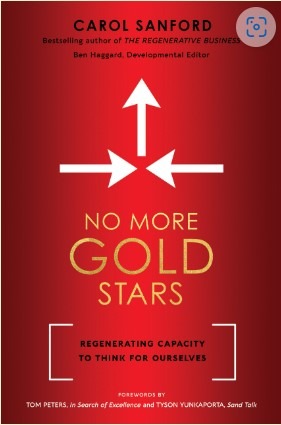
Rooted Leadership talk at Disrupt HR
Want to hear regenerative leadership explained in 5 minutes? Here’s a video of me speaking at Disrupt HR event in Nottingham. If you’d like to
Today’s Observer newspaper contains an interesting article about how the climate denial movement has transformed into the climate confusion movement. In this article I suggest ways we, as individuals, can avoid playing into their hands.
https://www.theguardian.com/science/2019/nov/09/doomism-new-tactic-fossil-fuel-lobby
I live my life inspired by natural systems – the ways they have been successful for 3.8 billion years, and specifically trees, that have a good 200m year track record in research and development. The tell us that the way to live is to follow the road of action, rather than inaction. Think productive, not paralysed, a tactic of problem-solving, trial, error and stickability.
Conversely, our humans brains, when faced with problems, often become stuck, not knowing what to do, and unable to make decisions. One such problem is the climate crisis – our responses are various – denial, fear, confusion, hopelessness, frustration, anger, sadness, grief, guilt. If you recognise these in yourself, then rest assured they are all totally natural. However, they all tend to lead to paralysis rather than action and none of these are going to help confront the biggest problem that humans have ever faced.
The scary thing happening right now is that the climate denial movement has new tactics. They know they can’t win the battle against the science that proves that man-made climate change is real. So they have upped the ante in face of the global climate action that is forcing change. They have manoeuvred on three main fronts.
First, to promote the view that individual actions should be the way forward, rather than confronting the corporations and structural economic problems that are the root causes. First win for the ‘business as usual’ climate confusion lobby. Of course we should do both. Recognising that the big structural changes that address our industrial ‘destructoculture’ (such as rapidly phasing out fossil fuels) will have the biggest impact, not only on carbon emissions and global heating, and on protecting and increasing biodiversity and wildlife. But individual actions do make a difference and most importantly, demonstrate to governments that people are willing to make the significant lifestyle changes necessary. (Of course billing them as ‘sacrifices’ rather than opportunities is another great climate confuser tactic, but that’s a whole different story).
Second, is to encourage individuals to argue over solutions. Encouraging the vegan vs farmers or flying vs having children arguments that are raging online and in our mainstream media right now. Exploiting the fact that, for consumers, making choices can be confusing and is not an exact science. For example, on the beef argument, there are some very specific regenerative agricultural techniques that can sequester carbon but this is used to justify all beef consumption. Some vegan ingredients are destructive, thus suggesting any vegan diet is bad. These arguments promote confusion (the same confusion tactic that was so successful in delaying action on climate for decades). When consumers are confused or arguing they aren’t taking action and are carrying on consuming the dirty energy and continuing the destructive lifestyles that the fossil fuel companies and their associates are desperate to hold onto. Our natural tendency is to find it all too confusing and carry on as normal. Even more so when we see ‘green’ solutions that are revealed to be not green at all (for example the VW emissions scandal, that I fell prey to).
Third, to encourage “doomism” – the idea that we’re all f*cked so there’s no point in doing anything anyway. This is the jackpot for the climate confusion industry. A sure-fire inaction strategy.
The Observer article (link above) written by Robin McKie quotes Michael Mann of Penn State University, on this subject:
“However, deniers have not given up their opposition to plans to curtail fossil fuel use and among their new tactics they have also tried to encourage “doomism”, as Mann put it. “This is the idea that we are now so late in the game [in tackling global warming] that there is nothing that we can do about the problem,” he added. “By promoting this doom and gloom attitude this leads people down a path of despair and hopelessness and finally inaction, which actually leads us to the same place as outright climate-change denialism.”
In my experience ‘doomists’ can go even further than being depressed in their own right, but turn to outright criticism of those who are aware of the facts, but want to continue to act. They are derided for buying electric cars, and are accused of taking ‘hopium’, assuming that seeing a different future is akin to taking a denial drug.
So, what can we, as individuals, do in the face of such tactics?
Here are my top ten ways we avoid falling prey to the fossil fuel confusion industry.
1. Recognise which emotions you are feeling in response to the climate crisis. Denial, fear, confusion, hopelessness, frustration, anger, sadness, grief, guilt or maybe even guarded excitement at new opportunities? Name them and bring them out into the light.
2. If your emotions are those of fear, grief and sadness, work out who you are mainly sad for – yourself; your children or grandchildren; wildlife and biodiversity loss; those people who will be impacted first, eg the global poor. These can be useful to keep in mind to keep you motivated in any future actions. In the recent climate actions, the arrestees who hit home to me most were ones that carried signs saying ‘doing this for my children’, but your motivators will be unique to you.
3. Work out how you can transform those emotions into action. Fear can be a really good motivator, for example. Terrified – that’s great news, it means you have moved from denial and are aware of the devastation that the climate crisis brings. Recognise that moving from denial into action can involve the intermediate steps of fear and grief. But don’t get paralysed into inaction.
4. Recognise that taking individual actions and campaigning for structural and economic change are not mutually exclusive – try to do both. Don’t be put off by those who say that doing one without the other is pointless. Go on a climate march, and cut your consumption of new clothes, for example.
5.Seek high-quality information about which climate and biodiversity activities are the most damaging. Get your information from reputable sources, rather than social media. Don’t get bogged down in there being no concrete answers.
6. Research which individual actions are best for you and your circumstances. Don’t assume that the actions other people are taking are right for you. You may have easier access to local food or public transport, but have a family member abroad who you would like to visit (or vice versa). You may not have the right roof for solar panels, but can easily switch to a green energy tariff. Don’t blindly follow others, forge your own, informed, path. Attending a carbon literacy course is a good way to start. https://carbonliteracy.com/
7. Be inspired by others, rather than feeling guilty with regard to their actions. Individual feelings of guilt and shame are common ways that individuals are pitted against each other – conflict is good for business in the eyes of the climate confusers. Guilt paves the way with gold (or oil) down the inaction road.
8. Encourage other people, eg friends and family who are taking action. Like their Facebook posts, comment that they are doing great things. Assume they are doing their best. Try not to argue with them, but encourage them instead. There’s nothing so demoralising to someone who’s just given up their favourite steaks to hear “yes, but…” (“not all steak is bad” or “I can’t give up steak” or “you’d be better or not flying” or “having children is much worse than that”.
9. Don’t feed the trolls. The internet is full of people trying to confuse, argue and be downright nasty to scare others from engaging. They may be fed by the climate denial lobby or have latched onto the false arguments to further their own agenda. I’m not talking about the genuinely curious or uninformed people here – try to gently persuade them in a kind way. But the trolls are just taking up your precious time that could otherwise be spent taking action. Commenting on social media posts from trolls increases their profile, whereas the aim should be not to give them oxygen.
10. Recognise that doing something rather than nothing is always best, even if you get it wrong. There is no such thing as ‘perfect’ when it comes to climate action. And don’t be scared of being called a hypocrite. We are all hypocrites as long as we are forced to live in a society that is structurally designed to make us so. You can go on a climate march and own a mobile phone (yawn at the amount of times we’ve heard that and other similar accusations peddled).
So go for it! – make changes, take action. Action sticks a big two fingers up at those that are trying to manipulate us all into confusion and conflict. There’s nothing they find more scary than that.
Sarah Spencer
Author: Think like a Tree: the natural principles guide to life
Signed copies available from www.thinklikeatree.co.uk

Want to hear regenerative leadership explained in 5 minutes? Here’s a video of me speaking at Disrupt HR event in Nottingham. If you’d like to

In “No More Gold Stars,” Carol Sanford challenges conventional notions of achievement and success. Carol is a renowned business consultant and educator and what struck

This week has felt a little bit epic! I have found myself taking deep, exhaling breaths as I sit with the medley of feelings I have